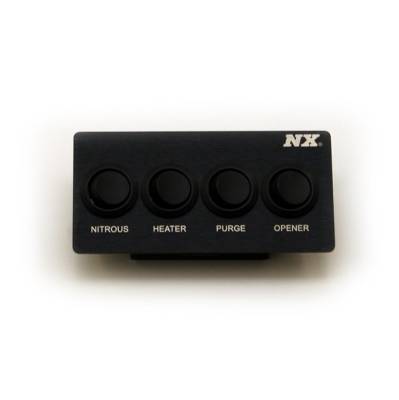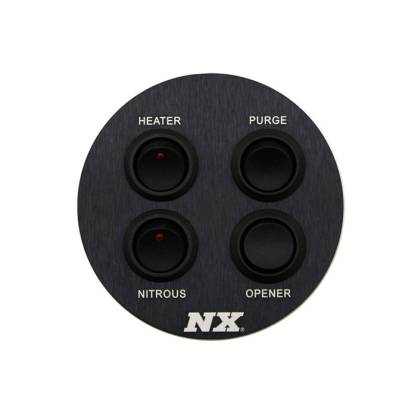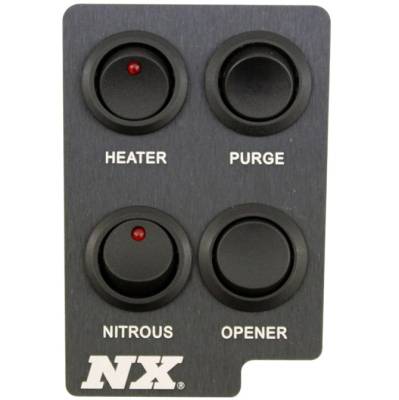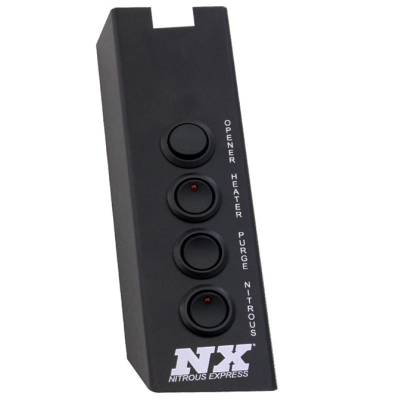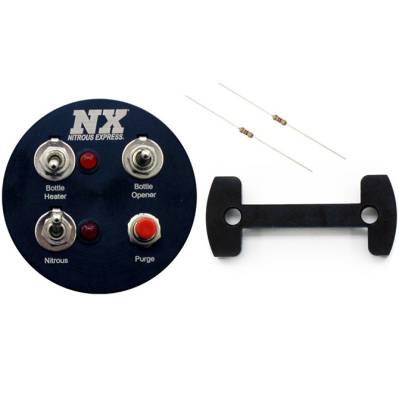- Home »
- Catalog »
- Forced Induction & Nitrous »
- Nitrous Systems and Components »
- Nitrous Electronics »
- Switch Panels
Modular Head Shop » Nitrous Express

Wow, how do I start to tell the world why NX is different and better than any other company? Let’s start with the NX philosophy:
- All components must be of the highest quality, no off shore junk!
- 99% of NX products are produced and assembled in the USA!
- All NX components and systems must be tested and proven before they are shipped to any customers!
- All horsepower claims must be accurate and dyno proven at the wheel!
- NX copies no one; we lead the industry in technology and innovation!
- Never be satisfied with the status quo!
- Always give the customer more than he expects!
Now let’s get to who NX really is, I’m Mike Wood. I own 100% of Nitrous Express and have been involved with the nitrous phenomenon since 1978. I started with a small NOS (Nitrous Oxide Systems) nitrous kit on my TransAm. I thought this is the greatest thing since the invention of the automobile! Soon thereafter I installed a NOS direct port kit, or fogger as NOS called it, on my racecar. It was cool but I experienced multiple issues right out of the box. Out of necessity I got involved with the science and hardware used with nitrous oxide. I soon discovered many opportunities for improvement in the current nitrous kits offered, corrected them and earned a reputation of being the “Go to Guy” if you wanted to run nitrous. This was pretty easy, in 1979 few people in the racing world had even heard of nitrous. At that time, there were only a couple of companies that made nitrous kits, the most common being Nitrous Oxide Systems or NOS. NOS was so dominant in those days that many consumers still refer to nitrous oxide as nos, noz or even nos nitrous.
Through the 1980’s and early 90’s nitrous jetting patterns and tune-up information were hit and miss at best. Out of necessity, I set up a flow bench to precisely measure the amounts of nitrous and fuel used by each nitrous kit. The information learned during the flow testing was invaluable. Before I knew it, I was modifying and hot rodding almost every part of every nitrous system I used and/or sold to my fellow racers.
We started NX in 1996 because we knew we could offer nitrous systems that out performed anything on the market right out of the box. Nitrous Express had an advantage; we got to start with a blank sheet of paper. We were able to manufacture our components with all the hot rod modifications built in. This allowed our customers to achieve better results right out of the box than other racers who were paying big money to modify our competitors’ parts. It was like a breath of fresh air!
If you are not asleep yet I will continue with the reasons NX’s technology is superior. Nitrous is a cryogenic, expansion gas. This means that under pressure the n2O is a liquid, looking much like water. When this pressure is released nitrous boils off at minus 127 degrees Fahrenheit in the form of an invisible gas. What you see when n20 is vented, such as a purge, is the ice crystals being frozen in the air by the super cold nitrous. Any turbulence in the flow path of nitrous whether under pressure or not will cause some amount of boiling, resulting in a mixture of gaseous and liquid nitrous. The company that can deliver the purest charge of nitrous to the discharge point will make the most power with a given jet size.
Nitrous Express has spent countless hours on the flow bench eliminating these turbulence points in its systems to minimize the boiling of the nitrous charge. NX has designed its own bottle valve, which differs in many ways from the standard or even custom valves offered by the other companies. First, the siphon tube that picks up the nitrous from the bottom of the bottle is integral with the bottle valve. There is no compression fitting attaching the tube to the valve as almost all of the other companies do. This eliminated the first turbulence point in the NX system. Secondly the flow path of the NX “Lightning 45” bottle valve has only one turn, a 45-degree angle to the discharge point. This eliminates the harsh 90-degree turn present in most bottle valves. One company who boasts of their “Super High Flow Valve” has designed in one 45-degree turn and one 127-degree turn inside the body of the valve. This severely restricts the flow and causes a turbulence point that sends a diluted flow of nitrous downstream to the nitrous solenoid. Finally, the style of bottle nipple used by NX allows the nitrous to transition from the valve to the supply hose with no internal steps or restrictions. These things may seem small or insignificant to the layperson, but on the dyno NX systems make more horsepower per pound of nitrous than anyone.
Still interested? The nitrous solenoid is a big offender in the turbulence area. Most companies use an industrial solenoid brought from the soft drink business. When you fill your Pepsi from a soft drink dispenser you are using the same solenoids all of the other nitrous companies use. Design wise, the worst case scenario is the nitrous solenoid that has the inlet on one side, and the opposite side is the outlet. The nitrous flow path takes four 90-degree turns from inlet to outlet creating massive turbulence and boiling. The next worse offender is the bottom outlet nitrous solenoid, it has three 90-degree turns, and this helps by reducing the turbulence by 25%. NX manufactures its own solenoids, the Lightning Series, which have been redesigned to have only one 90-degree turn in the flow path, thus reducing turbulence by 75% and significantly increasing flow.
Now this brings us to the metering jets. Some companies brag about stainless steel jets and warn that the nitrous can erode the metal in brass jets causing erratic flow numbers. Wow, you know I guess they are right, given enough time the flow of nitrous through a brass jet can erode the orifice size. The only thing they don’t tell you is that it would take about a million years, not a concern for most of us and the same can be said about stainless steel given enough time! Let’s talk about the real issue here, accuracy. NX jets are produced on the finest CNC machines in the world and every tenth jet is hand gauged to be sure every jet is plus or minus two ten thousandths of an inch within its stamped size. Some of our competitor’s jets are not within two thousandths of an inch in accuracy! The basic design of the NX jets allows them to flow more nitrous and fuel than most of our competitor’s designs. Sometimes up to 34% more! Accurate and efficient metering jets are the heart of every safe reliable nitrous system.
Even with the best hardware on the planet it means nothing if you do not have the science side of the nitrous equation correct. Every nitrous system NX creates is set up and calibrated on a sophisticated flow bench that mimics the nitrous/fuel system on your vehicle. First the nitrous side is flowed, metered and calculated to ascertain pounds of nitrous used per hour and to assign horsepower levels. Then the system is connected to the fuel side of the flow bench to match the fuel delivery to the nitrous delivery. Every horsepower level is run on the bench to be sure that the customer will receive a safe reliable nitrous system.
If you have read this entire piece you may have notice that I always refer to an NX product as a “nitrous system” and to other manufacturers’ products as “nitrous kits”. There is a reason for this. A system is a product that works when you unpack it, all the technical points have been worked out and all you have to do is bolt it on and go have fun. A kit, on the other hand, is something where you get a box of parts and you must figure out how to assemble it and make it work by trial and error.
In conclusion, we hope that you will choose NX for all your nitrous needs. If you ever need advice, technical help or need to know where to get nitrous oxide, just call us. A real, live human will answer the phone and provide you with accurate information based on years of experience. It is our commitment and our mission to provide the best service, performance, quality and value.

